Why Do Doctors Tell a Person Hey Cant Eat Beef
Nutritionist Michael Joseph publishes the Nutrition Advance website in the Us which provides independent, evidence-based nutrition and health information backed by peer-reviewed studies as testify. Here he takes a closer look at the health benefits of beef.

A generation or two agone, our parents and grandparents viewed beefiness as a nutritious health food.
Just at present? These days it's much different, and opinion is split between whether beef is healthful or harms our health.
Some of the more farthermost vegan views even phone call for the regime to remove meat from the nutrient supply.
Whatsoever our stance on cerise meat might be, there are some important health benefits of eating beef.
This article takes a close look at 11 of them.
1. Beef Provides a Large Source of L-Carnitine
50-carnitine is an amino acrid that occurs naturally in meat products.
In the table below, we tin meet the L-carnitine content of beef compared to some other creature foods and institute foods (one);
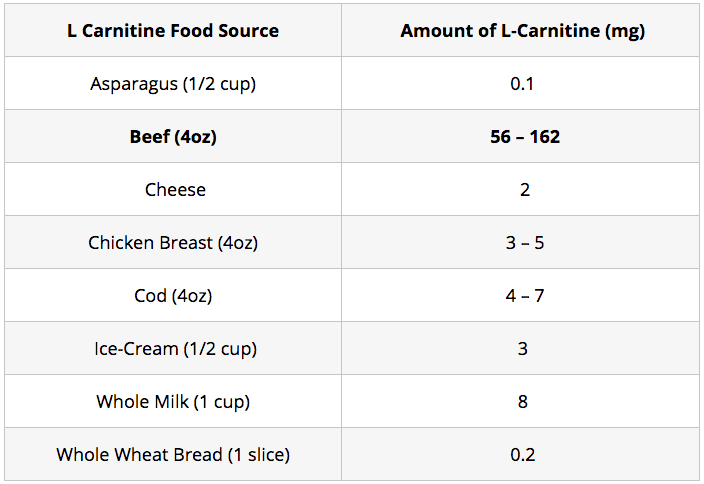
Why is L-Carnitine Important?
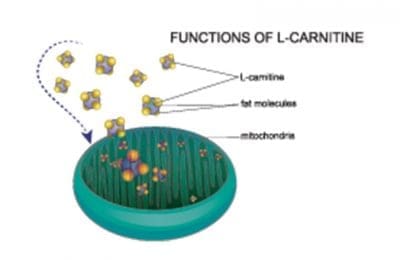 Among other functions, 50-carnitine plays a function in fat metabolism.
Among other functions, 50-carnitine plays a function in fat metabolism.
As part of this, L-Carnitine does the chore of transporting fats into our mitochondria for called-for.
It's important to analyze that our body tin can synthesize sufficient amounts of L-carnitine for general needs; this makes it a non-essential amino acid.
The body synthesizes L-Carnitine inside the liver and the process relies on the amino acids L-lysine and L-methionine (2).
As a result, deficiencies are rare.
However, research suggests that a higher dietary intake of Fifty-Carnitine may accept some positive health impacts.
Diverse studies bear witness the following findings;
Heart Health
A meta-analysis of randomized trials suggests that L-carnitine improves patient outcomes. Specifically, it exerts an effect on hypertension, oxidative stress, nitric oxide, and inflammation.
A farther systematic review found that Fifty-carnitine is associated with a 27% reduction in all-cause bloodshed in heart failure patients (3, 4).
Diabetes
A systematic review shows that college Fifty-carnitine intake in type 2 diabetes patients improves fasting glucose levels and the overall cholesterol profile (5).
Weight Loss
Co-ordinate to a systematic review and meta-analysis of nine randomized controlled trials, subjects using L-carnitine supplementation lost "significantly more weight" than the control group (six).
It's worth noting that while at that place are many Fifty-carnitine supplements around, the absorption charge per unit is poor in comparison to beef.
In fact, our torso merely absorbs around fourteen-18% of the synthetic grade of the nutrient (7).
Fundamental Point: L-carnitine is an amino acid that naturally occurs in beefiness. Information technology has a positive impact on various health markers.
2. Beef Provides the "Chief Antioxidant" Glutathione
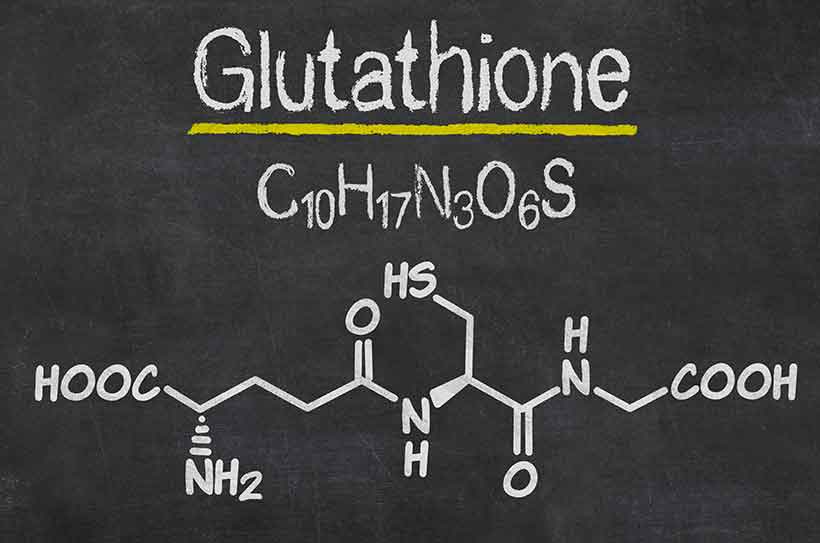
Normally known as the 'master antioxidant,' glutathione has a score of enquiry linking it to (8);
- Anti-aging benefits
- Increasing longevity
- Preventing illness
- Reducing the risk of chronic disease
- Strengthening the immune organization
It helps protect every cell in our body from cellular damage, which tin lead to many chronic diseases.
On the other hand, a deficiency in glutathione contributes to oxidative stress and inflammation (9).
Every bit a result, keeping glutathione levels high is important for our overall wellness.
Later, the question becomes "how can we go on our glutathione levels high?"
Endogenous Glutathione Production and Dietary Sources
Beginning of all, our body produces glutathione endogenously.
In other words, our body uses raw materials (in this instance: amino acids) to make glutathione.
For this process to occur, we should have adequate levels of the amino acids cysteine, glutamate, and glycine (10).
These amino acids are known equally glutathione precursors, and each of these amino acids is present in beefiness.
On the positive side, beefiness also contains a reasonably high source of complete (pre-formed) dietary glutathione.
Central Point: Keeping our glutathione levels high is disquisitional for proficient health, and beefiness is a food that helps us to achieve this. Glutathione detoxes our trunk better than any 'detox plan' or supplement can.
iii. Beef is High in Protein and Helps Improve Muscle Mass

At that place are numerous reasons why nosotros should strive to ensure a sufficient protein intake and these include;
- Protein is the edifice cake our trunk uses to repair and make os, pare, and cartilage.
- Sufficient poly peptide helps us to build and maintain lean muscle mass.
- Out of all macronutrients, poly peptide is the most satiating, and information technology discourages food cravings.
Beefiness is packed with wellness-promoting amino acids, and information technology's 1 of the single biggest sources of protein in the human diet.
For instance, a 6oz (170g) portion of eighty% lean beef provides 46g protein.
Should we opt for a leaner variety of beef, the poly peptide content can be even higher (eleven).
The Importance of Lean Mass
As nosotros age, building—or at least holding on to—lean mass should be a priority.
Enquiry shows that older adults with lower musculus mass are at a college risk of mortality.
Speaking frankly, the more skeletal muscle mass someone loses every bit they age, the higher their run a risk of an earlier decease (12).
Besides, the charge per unit of muscle poly peptide synthesis rapidly drops equally we age, making it a lot harder to build and maintain muscle (thirteen).
Considering this, we should ensure we're eating a sufficient amount of protein – this is peculiarly essential for elderly people.
On this notation, beefiness is ane of the all-time poly peptide-rich foods out at that place.
Key Point: Protein is essential for optimal health, and especially so as we age. Beefiness provides an arable amount of this macronutrient.
4. Beef is Extremely Rich in Minerals
If you lot're looking to increase your intake of various minerals, then beef is one of the all-time options to consider.
First of all, beef is relatively food-dense in minerals.
Hither we tin can encounter the mineral content of eighty% lean beef (eleven);
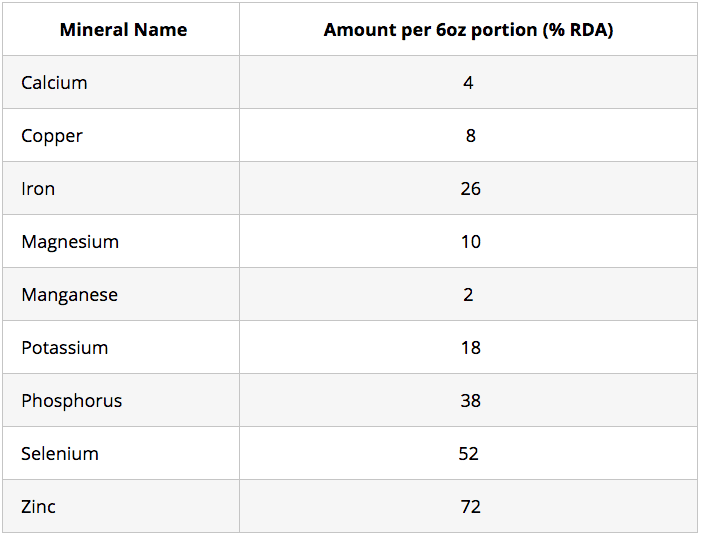
As shown in the tabular array, beef provides more than half of the 24-hour interval's recommended amount of selenium and zinc.
Many people have deficiency bug with some of these minerals.
So, the nutritional value of beef can aid fight prevalent global deficiencies in iron, magnesium, and zinc (14, 15, 16).
Key Point: Beef is rich in several essential minerals—particularly iron, phosphorus, selenium, and zinc.
5. Eating Beefiness Helps Forestall Fe Deficiency Anemia
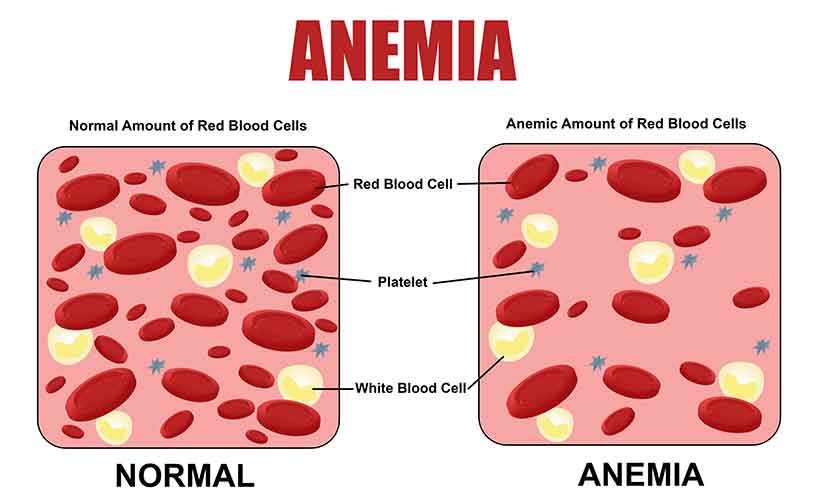
We touched on mineral deficiencies in the concluding bespeak, but iron deficiency anemia deserves a mention of its own.
Sadly, iron deficiency anemia is a growing epidemic effectually the world.
In a adult country such as the United states of america, nutrient deficiencies shouldn't be a cause of death, notwithstanding anemia kills thousands every year.
To be exact, the latest release of statistics showed that Anemia hospitalized 146,000 Americans in one year. five,219 of these people died (17).
Globally it'southward even worse, and according to the World Health Organization, 1.62 billion people suffer from iron deficiency anemia (18).
Heme and Non-Heme Iron
There are two types of atomic number 26 available in food, and we refer to them as heme and non-heme iron.
- Heme Fe: Heme iron is the most bioavailable form of iron, and meat and other animal foods exclusively contain it.
- Non-Heme Iron: Not-heme iron is found in plant foods such every bit fruit, vegetables, and nuts. In comparison to heme iron, our body finds it more than difficult to absorb.
One of the best health benefits of beef meat is that information technology contains a substantial amount of heme fe.
The best source of all? Beef liver.
Interestingly, anemia disproportionately affects females. Perhaps this isn't a huge surprise when we think about how club seems to shame women who eat meat.
The imagery of women smiling while eating a bowl of salad is quite ubiquitous.
Key Point: Swallow more beefiness to help forestall atomic number 26 deficiency anemia.
vi. Beef Contains Carnosine, a Strong Amino Acid
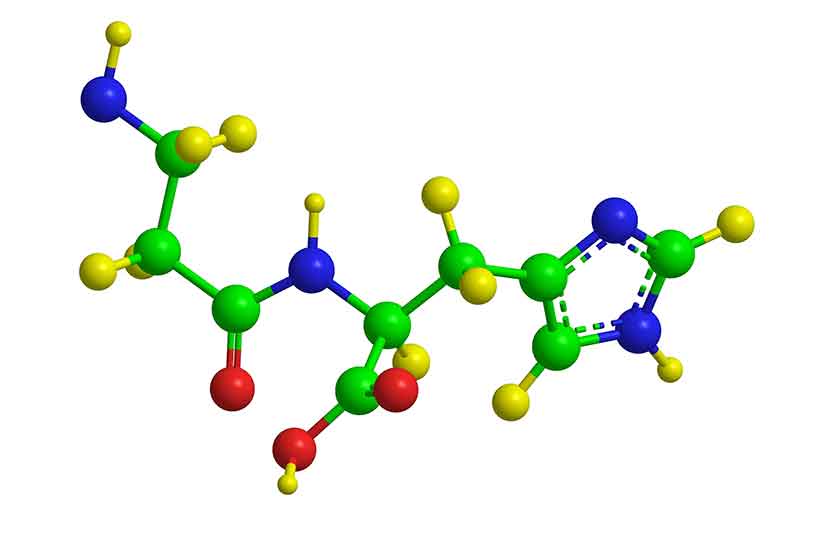
Another advantage of eating beef is that information technology provides an abundance of carnosine.
Carnosine (beta-analyl-L-histidine) is an amino acid found throughout the body, and it has several important roles in human health.
As beef is one of the highest sources of carnosine (containing about l% more than poultry), this is another health benefit.
What Does Carnosine Do?
For one thing, carnosine has anti-glycosylation properties.
To be exact, carnosine reduces the harms of a process chosen 'glycation' which involves avant-garde glycation end-products (AGES).
Glycation is central to the crumbling procedure and progressively damages our trunk, potentially leading to atherosclerosis and various other chronic diseases (19, xx).
Additionally, carnosine helps boost the immune organisation and reduce inflammation. The amino acid is also idea to assist prevent lipid peroxidation within our cells (21, 22).
Key Bespeak: Beef (and red meat in full general) is the all-time dietary source of carnosine.
7. Beef is Full of Vitamins
There are many important nutrients in beef, and those present in significant amounts include the range of B vitamins (11);
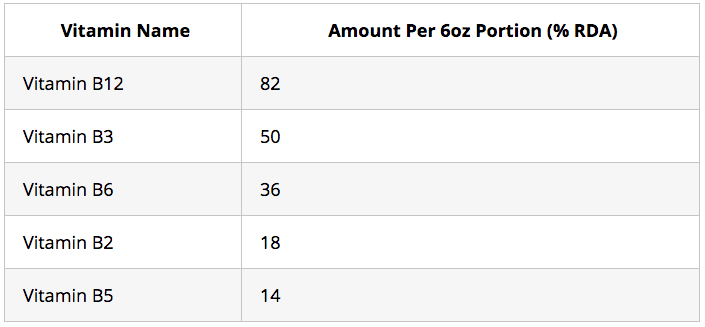
Additionally, beef also contains smaller amounts of vitamins E and M.
Vitamin B12 (cobalamin) is a notably essential nutrient, and this is because information technology is merely available from fauna foods.
This vitamin also has a wealth of benefits that include skin improvements, positive mood, better slumber, and neural regeneration (23, 24).
It'southward of import to realize that bereft vitamin B12 may as well increase the risk of low and mental wellness issues (25, 26).
Fortunately, a 6oz serving of beefiness provides almost 100% of the recommended amount of B12.
Those nearly at risk from B12 deficiency are vegetarians/vegans, and these groups should supplement with the vitamin.
Key Signal: Beef is high in B vitamins which help promote health. Vitamin B12 is particularly important since it isn't present in plant-based foods.
8. Conjugated Linoleic Acrid
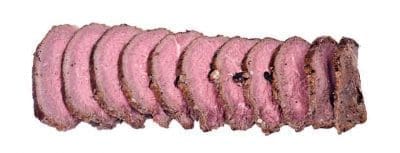 Otherwise known as CLA, conjugated linoleic acid is a naturally occurring trans-fat.
Otherwise known as CLA, conjugated linoleic acid is a naturally occurring trans-fat.
Don't worry, although the "trans-fatty" name is a piffling scary, it has a very dissimilar effect to the constructed version.
Randomized controlled studies involving human participants suggest that;
- Conjugated linoleic acrid helps to meliorate insulin sensitivity (30)
- CLA appears to promote fatty loss (31, 32)
Notably, the bulk of the testify suggests that getting CLA from real food is ameliorate than supplementation (33).
Every bit is normally the case, mayhap nutrients in whole foods accept a dissimilar result to a synthetic pill?
Food Sources of CLA
The top sources of CLA include meat and dairy products.
After lamb and certain cheeses, beefiness is the next highest provider of the nutrient.
Although all beef contains CLA, grass-fed meat offers a significantly higher corporeality than beef from non-ruminants.
Specifically, the average amount of CLA in grass-fed beef is 0.46% of the fat content.
With grain-fed beef, this average content drops to 0.16% of fat (34).
Key Point: Beef—especially from grass-fed cows—is one of the highest sources of conjugated linoleic acid.
9. Beefiness Contains the Operation Enhancer Creatine
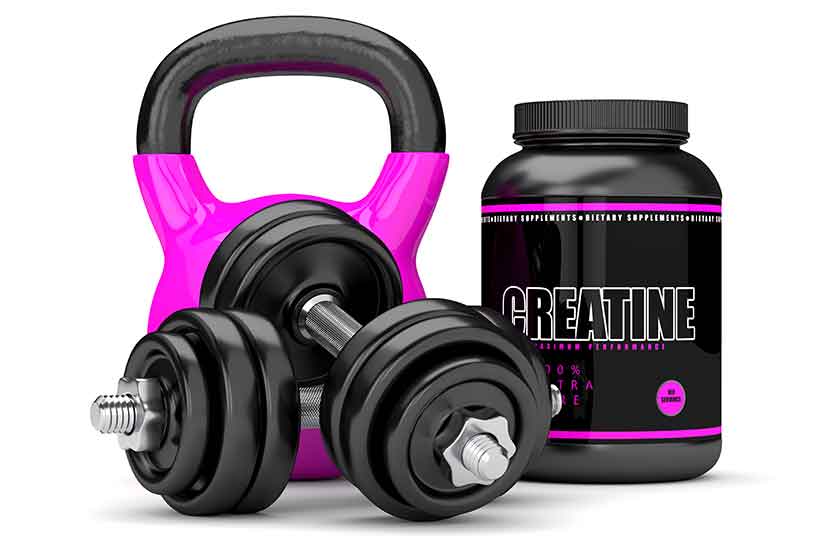
Almost everyone knows the dietary supplement version of creatine, but did you lot know that beef contains it too?
In fact, beef typically contains 350mg creatine per 100g (35).
The health benefits that creatine bring include;
- Improved exercise performance
- Creatine assists in muscle growth and development
- Provides muscles with greater free energy supply and improves endurance
- Increased muscular size
It's also worth noting that our liver tin can produce about 2g creatine per day, depending on the pre-cursors existence available.
Creatine precursors include arginine, glycine, and methionine (36).
Not only are all of these amino acids present in beef, but beef is 1 of the single nearly significant dietary sources for them.
In other words, eating beefiness gives you a decent amount of dietary creatine, and it helps your body to produce information technology too.
Key Point: Beef has two positive impacts on creatine levels. Firstly, it direct provides it to the body and secondly, it helps the body to make it.
x. Beef is Very Affordable
 We may hear how beef is so much more expensive than vegetables and other plant-based foods.
We may hear how beef is so much more expensive than vegetables and other plant-based foods.
For some reason, these claims often compare broccoli to beef.
Yet, these calculations are a piffling disingenuous. Yes, broccoli is indeed a lot cheaper than beef per 100g.
But just how much free energy does 100g provide?
200g of beef will typically provide effectually 550 calories, merely 200g of broccoli only contains 70 calories (11, 37).
This means that per 100g, beefiness contains eight times the amount of energy than broccoli.
It is therefore credible: per calorie, beef is substantially cheaper than broccoli – and probably every vegetable.
Key Point: Per calorie, beefiness is a very affordable nutrient – it's cheaper than vegetables.
11. Beef is Very Simple to Make
This ane isn't a health benefit as such, but it could exist if it encourages more home cooking.
Beef is a straightforward food to cook. It requires no lengthy recipe or complex preparation procedures.
Add a fiddling salt, put it in the oven, and wait until done.
In an age where people claim not to have fourth dimension to cook, a traditional dinner of beefiness and veggies is very uncomplicated and time-efficient.
Key Point: Beef requires minimal grooming, and it'due south quick and uncomplicated to cook.
Terminal Thoughts
Beef contains dozens of health-promoting nutrients that we need in our nutrition.
Sure, in that location are other foods which offer some of the same positives, but not in the same amount.
Overall, it is one of the nearly nutrient-dumbo foods in the human diet.
Bottom line: in that location are many health benefits of eating beef.
This article was originally published on Michael Joseph's Nutrition Accelerate website and is republished here with his permission. Michael Joseph is a U.s.a. nutritionist who holds a Master of Science Degree in Nutrition Education. To visit his website click here
Source: https://www.beefcentral.com/news/community-and-lifestyle/beef-nutrition/11-health-benefits-of-eating-beef/
0 Response to "Why Do Doctors Tell a Person Hey Cant Eat Beef"
Post a Comment